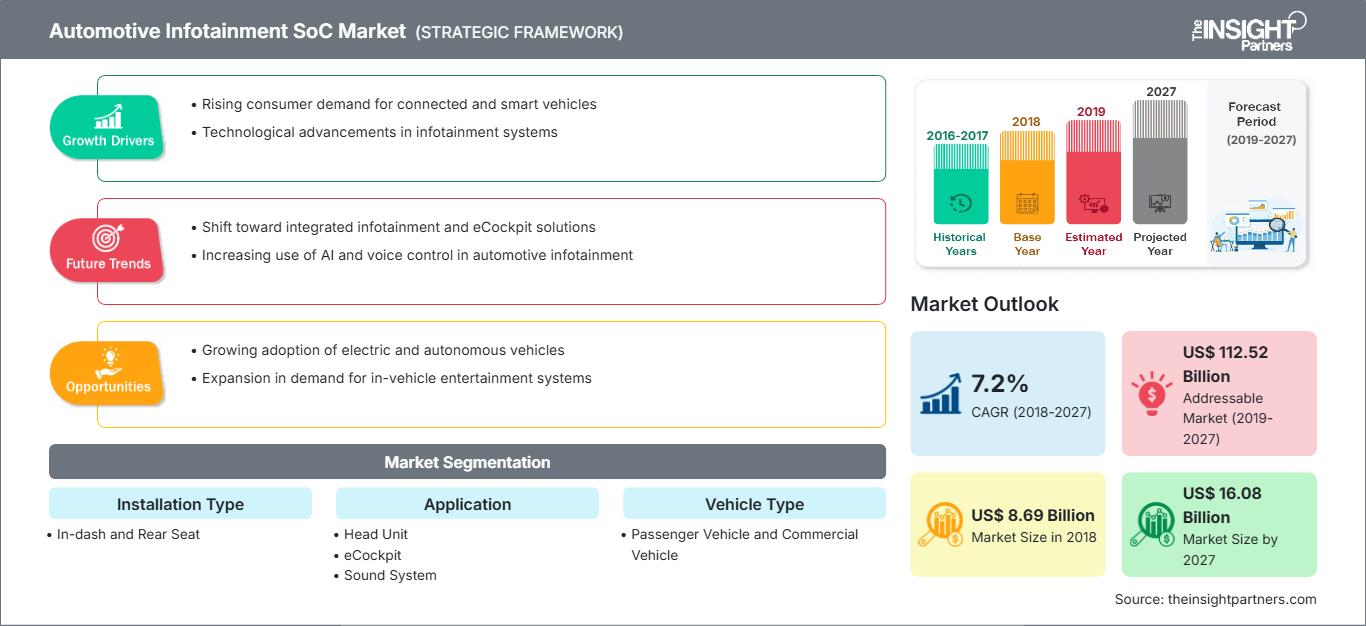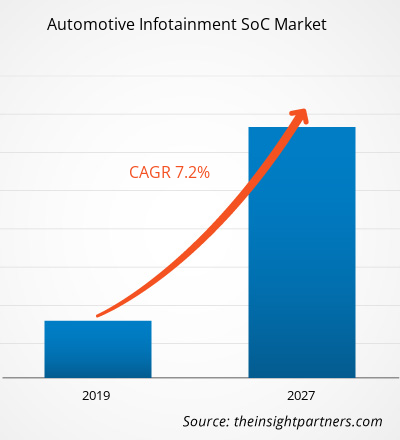Il mercato dei SoC per l'infotainment automobilistico è stato valutato a 8.694,6 milioni di dollari nel 2018 e si prevede che raggiungerà i 16.077,6 milioni di dollari entro il 2027; si prevede una crescita a un CAGR del 7,2% dal 2019 al 2027.
Il SoC per l'infotainment automobilistico è un chip integrato progettato per servizi di informazione, telefonia e intrattenimento in autovetture e veicoli commerciali. Si tratta di un sistema di substrato elettronico completo contenente funzioni analogiche, digitali, segnali misti e radiofrequenza. I SoC per l'infotainment automobilistico occupano meno spazio e area rispetto ai design multi-chip. I SoC sono ampiamente utilizzati nei sistemi embedded e nell'Internet of Things per l'informatica automobilistica. Il settore opera in un mercato competitivo, poiché le aziende leader in questo settore continuano ad ampliare il proprio mercato di riferimento espandendo l'attuale portafoglio prodotti, diversificando la propria base clienti e sviluppando nuove applicazioni e mercati. Nuovi sviluppi e fusioni e acquisizioni sono i due trend di mercato degni di nota osservati negli ultimi anni. Le aziende della catena del valore stanno acquisendo e stringendo partnership con altri attori del mercato per mantenere la propria posizione e fornire soluzioni efficienti ai propri clienti. I principali attori del mercato dei SoC per l'infotainment automobilistico hanno sede negli Stati Uniti e in altri paesi europei come la Germania. L'industria automobilistica, sia nelle economie sviluppate che in quelle in via di sviluppo, sta attraversando un periodo di trasformazione digitale. Molti attori industriali del settore automobilistico stanno investendo notevoli risorse nella ricerca e sviluppo dell'automazione dei veicoli, al fine di soddisfare le mutevoli esigenze e migliorare l'esperienza di guida dei clienti. Automobili di nuova generazione come sensori audiovisivi, riconoscimento vocale, compatibilità delle immagini, assistenza alla guida avanzata, funzionalità GPS e radar, sicurezza e protezione di livello superiore e illuminazione anteriore a LED integrata nei circuiti integrati. I SoC per l'infotainment automobilistico svolgono un ruolo chiave nell'automazione dei veicoli, poiché vengono utilizzati nelle automobili per integrare diverse funzionalità avanzate. Pertanto, diverse case automobilistiche stanno adottando SoC per l'infotainment automobilistico per offrire un'esperienza di guida ottimale ai propri clienti, stimolando così la domanda di SoC per l'infotainment automobilistico. Durante il periodo di previsione, si prevede che l'industria automobilistica guiderà la domanda di SoC per l'infotainment automobilistico a livello mondiale, alimentando il mercato dei SoC per l'infotainment automobilistico.
Si prevede che l'area Asia-Pacifico manterrà la sua posizione dominante nel mercato globale dei SoC per l'infotainment automobilistico durante il periodo di previsione. Attualmente, il mercato dei SoC per l'infotainment automobilistico nell'area Asia-Pacifico sta vivendo una crescita impressionante, attribuibile a numerosi fattori. I fattori più significativi che hanno influenzato la crescita di questo settore sono l'aumento del reddito disponibile dei consumatori e il conseguente aumento del numero di autovetture; una maggiore densità del traffico, che porta a maggiori congestioni e a un aumento del tempo medio di viaggio dei viaggiatori, e i paralleli progressi compiuti nel settore dell'elettronica di consumo. La spesa dei consumatori per l'elettronica automobilistica e altri accessori correlati è cambiata drasticamente, offrendo attualmente enormi opportunità per le aziende. I sistemi touchscreen sono stati ampiamente utilizzati in molti dispositivi elettronici di consumo, come gli smartphone, e il loro potenziale è stato trasferito a questo settore. Questi fattori stanno alimentando la domanda di SoC per l'infotainment automobilistico nell'area Asia-Pacifico. Inoltre, l'Europa rappresentava il 32,59% del mercato globale dei SoC per l'infotainment automobilistico. Un fattore chiave che guida la crescita del mercato dei SoC per l'infotainment automobilistico in Europa è l'elevata adozione di sistemi di infotainment nelle auto premium e nei segmenti medio-bassi. Si prevede che anche altri fattori, come le crescenti preoccupazioni in materia di sicurezza e protezione, unite alle conseguenti normative governative, guideranno la crescita del mercato dei SoC per l'infotainment automobilistico. Inoltre, si prevede che la rapida crescita della produzione di veicoli elettrici aumenterà la domanda di sistemi di infotainment automobilistico, poiché questi sistemi possono avvisare gli utenti dei veicoli elettrici della presenza di stazioni di ricarica nelle vicinanze. Pertanto, l'aumento della domanda di sistemi di infotainment automobilistico stimola la domanda di SoC per l'infotainment automobilistico.
Personalizza questo rapporto in base alle tue esigenze
Potrai personalizzare gratuitamente qualsiasi rapporto, comprese parti di questo rapporto, o analisi a livello di paese, pacchetto dati Excel, oltre a usufruire di grandi offerte e sconti per start-up e università
Mercato dei SoC per l'infotainment automobilistico: Approfondimenti strategici

- Ottieni le principali tendenze chiave del mercato di questo rapporto.Questo campione GRATUITO includerà l'analisi dei dati, che vanno dalle tendenze di mercato alle stime e alle previsioni.
Approfondimenti di mercato: l'aumento del reddito disponibile e del tenore di vita nei paesi in via di sviluppo traina le vendite di automobili
Potrai personalizzare gratuitamente qualsiasi rapporto, comprese parti di questo rapporto, o analisi a livello di paese, pacchetto dati Excel, oltre a usufruire di grandi offerte e sconti per start-up e università
Mercato dei SoC per l'infotainment automobilistico: Approfondimenti strategici

- Ottieni le principali tendenze chiave del mercato di questo rapporto.Questo campione GRATUITO includerà l'analisi dei dati, che vanno dalle tendenze di mercato alle stime e alle previsioni.
Le regioni in via di sviluppo del mondo, come Asia-Pacifico, Medio Oriente, Africa e Sud America, sono caratterizzate da prospettive economiche globali positive, dalla crescita della classe media e dall'aumento del reddito disponibile. Tutti questi fattori stanno trainando le vendite di autovetture in queste regioni. Nonostante una certa flessione nelle vendite del settore automobilistico negli ultimi tempi, si stima che le prospettive di crescita complessive saranno positive nel periodo di previsione dal 2019 al 2027. Il numero di auto di proprietà varia significativamente nei mercati in via di sviluppo, tuttavia, il numero di autovetture per nucleo familiare ha registrato un aumento costante nell'ultimo decennio. L'aumento del reddito disponibile e l'aumento della classe media sono i principali fattori che trainano le vendite di autovetture nei mercati emergenti del mondo. Le economie in via di sviluppo hanno assistito a una crescita costante nel periodo post-recessione, con conseguente aumento del reddito disponibile dei consumatori.
Approfondimenti di mercato basati sul tipo di installazione
Il mercato dei sistemi SOC (PV) per l'infotainment automobilistico, in base al tipo di installazione, è stato segmentato in installazioni in plancia e sui sedili posteriori. Il segmento in plancia ha rappresentato la quota maggiore del mercato dei sistemi SOC per l'infotainment automobilistico nel 2018. Inoltre, si prevede che il segmento dei sedili posteriori crescerà a un ritmo più rapido durante il periodo di previsione. I sistemi SOC per l'infotainment automobilistico vengono sempre più utilizzati nei cruscotti per offrire un'esperienza di guida più semplice. Tuttavia, con la crescita del settore, la loro richiesta per le installazioni sui sedili posteriori è in aumento.
Approfondimenti di mercato basati sull'applicazione
Il mercato globale dei sistemi SOC per l'infotainment automobilistico, in base alle applicazioni, è stato segmentato in unità principale, eCockpit, impianto audio e altri. Nel 2018, il segmento delle head unit ha dominato il mercato globale dei sistemi SOC per l'infotainment automobilistico. Con il crescente progresso tecnologico e l'integrazione di design migliorati, l'infotainment automobilistico viene utilizzato in diverse applicazioni.
Lo sviluppo del prodotto è la strategia comunemente adottata dalle aziende per espandere il proprio portafoglio prodotti. Texas Instruments Incorporated, Intel Corporation, Qualcomm Incorporated, NVIDIA Corporation e Infineon Technologies AG, tra gli altri, sono i principali attori che implementano strategie per ampliare la base clienti e acquisire una quota significativa nel mercato globale dei sistemi SOC per l'infotainment automobilistico, il che a sua volta consente loro di mantenere il proprio marchio. Alcuni dei recenti sviluppi chiave sono:
- Nel 2019, Polestar, un nuovo marchio indipendente di auto elettriche ad alte prestazioni di cui Volvo Cars detiene una quota di proprietà del 50%, sta integrando un sistema di infotainment di bordo (IVI) basato su un processore Intel Atom®. Processore serie A3900.
- Nel 2019, Infineon Technologies ha acquisito Cypress Semiconductor per 10 miliardi di dollari, l'ultima di una serie di acquisizioni di fornitori di chip per la connettività avvenute negli ultimi mesi. La maggior parte del business automotive di Cypress è generata da microcontrollori per l'infotainment e soluzioni di connettività, che ne aumenterebbero la forza.
Approfondimenti regionali sul mercato dei SoC per l'infotainment automobilistico
Le tendenze e i fattori regionali che influenzano il mercato dei SoC per l'infotainment automobilistico durante il periodo di previsione sono stati ampiamente spiegati dagli analisti di The Insight Partners. Questa sezione illustra anche i segmenti e la geografia del mercato dei SoC per l'infotainment automobilistico in Nord America, Europa, Asia-Pacifico, Medio Oriente e Africa, America meridionale e centrale.
Ambito del rapporto sul mercato dei SoC per l'infotainment automobilistico
| Attributo del rapporto | Dettagli |
|---|---|
| Dimensioni del mercato in 2018 | US$ 8.69 Billion |
| Dimensioni del mercato per 2027 | US$ 16.08 Billion |
| CAGR globale (2018 - 2027) | 7.2% |
| Dati storici | 2016-2017 |
| Periodo di previsione | 2019-2027 |
| Segmenti coperti |
By Tipo di installazione
|
| Regioni e paesi coperti | Nord America
|
| Leader di mercato e profili aziendali chiave |
|
Densità dei player del mercato SoC per l'infotainment automobilistico: comprendere il suo impatto sulle dinamiche aziendali
Il mercato dei SoC per l'infotainment automobilistico è in rapida crescita, trainato dalla crescente domanda degli utenti finali, dovuta a fattori quali l'evoluzione delle preferenze dei consumatori, i progressi tecnologici e una maggiore consapevolezza dei vantaggi del prodotto. Con l'aumento della domanda, le aziende stanno ampliando la propria offerta, innovando per soddisfare le esigenze dei consumatori e sfruttando le tendenze emergenti, alimentando ulteriormente la crescita del mercato.

- Ottieni il Mercato dei SoC per l'infotainment automobilistico Panoramica dei principali attori chiave
- In-dash
- Sedile posteriore
Per applicazione
- Unità principale
- eCockpit
- Sistema audio
- Altro
Per tipo di veicolo
- Veicolo passeggeri
- Veicolo commerciale
Profili aziendali
- Infineon Technologies AG
- Intel Corporation
- NEC Corporation
- NVIDIA Corporation
- NXP Semiconductors NV
- Qualcomm Incorporated
- Renesas Electronics Corporation
- STMicroelectronics NV
- Texas Instruments Incorporated
- Semiconductor Components Industries, LLC (ON Semiconduttore)
- Analisi storica (2 anni), anno base, previsione (7 anni) con CAGR
- Analisi PEST e SWOT
- Valore/volume delle dimensioni del mercato - Globale, Regionale, Nazionale
- Industria e panorama competitivo
- Set di dati Excel
Report recenti
Testimonianze
Motivo dell'acquisto
- Processo decisionale informato
- Comprensione delle dinamiche di mercato
- Analisi competitiva
- Analisi dei clienti
- Previsioni di mercato
- Mitigazione del rischio
- Pianificazione strategica
- Giustificazione degli investimenti
- Identificazione dei mercati emergenti
- Miglioramento delle strategie di marketing
- Aumento dell'efficienza operativa
- Allineamento alle tendenze normative




















 Ottieni un campione gratuito per - Mercato dei SoC per l'infotainment automobilistico
Ottieni un campione gratuito per - Mercato dei SoC per l'infotainment automobilistico